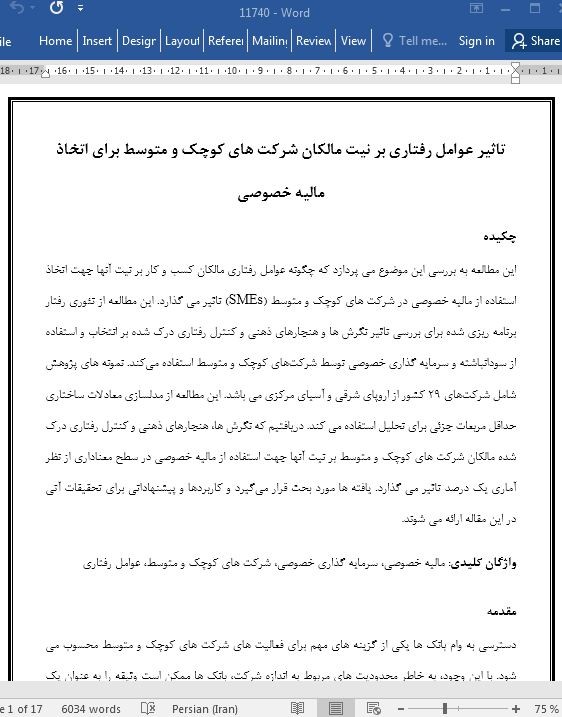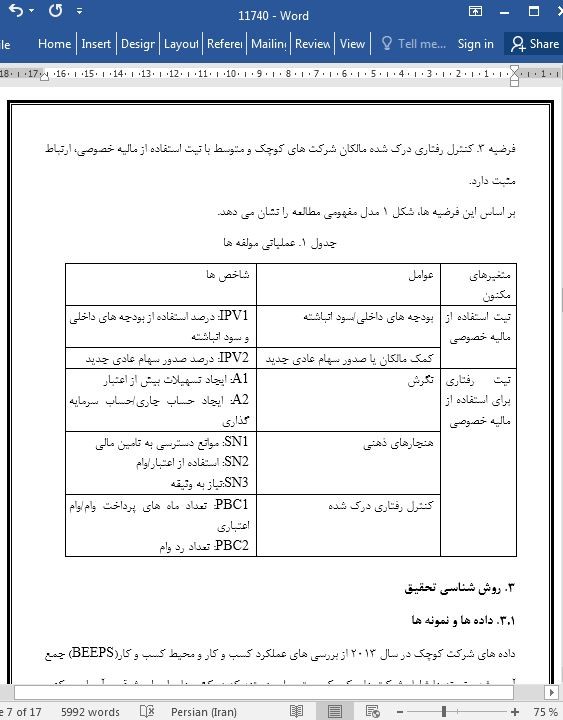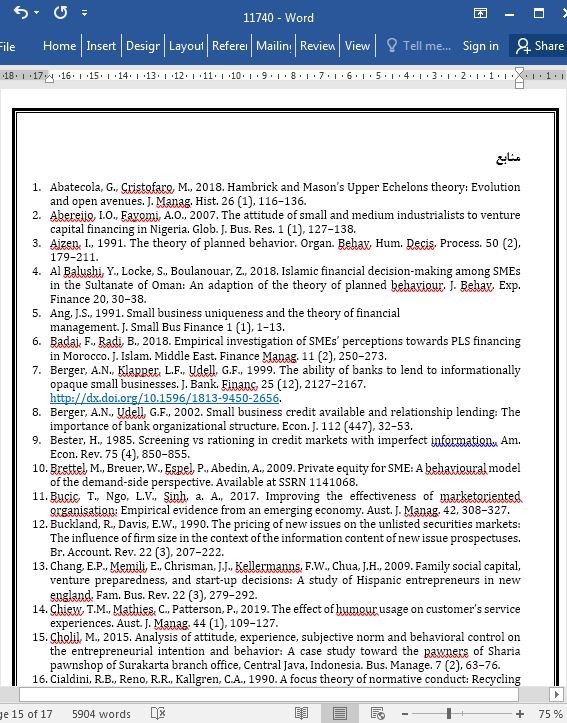
تاثیر عوامل رفتاری بر نیت مالکان شرکت های کوچک و متوسط برای اتخاذ مالیه خصوصی
چکیده
این مطالعه به بررسی این موضوع می پردازد که چگونه عوامل رفتاری مالکان کسب و کار بر نیت آنها جهت اتخاذ استفاده از مالیه خصوصی در شرکت های کوچک و متوسط (SMEs) تاثیر می گذارد. این مطالعه از تئوری رفتار برنامه ریزی شده برای بررسی تاثیر نگرش ها و هنجارهای ذهنی و کنترل رفتاری درک شده بر انتخاب و استفاده از سودانباشته و سرمایه گذاری خصوصی توسط شرکتهای کوچک و متوسط استفاده میکند. نمونه های پژوهش شامل شرکتهای ۲۹ کشور از اروپای شرقی و آسیای مرکزی می باشد. این مطالعه از مدلسازی معادلات ساختاری حداقل مربعات جزئی برای تحلیل استفاده می کند. دریافتیم که نگرش ها، هنجارهای ذهنی و کنترل رفتاری درک شده مالکان شرکت های کوچک و متوسط بر نیت آنها جهت استفاده از مالیه خصوصی در سطح معناداری از نظر آماری یک درصد تاثیر می گذارد. یافته ها مورد بحث قرار میگیرد و کاربردها و پیشنهاداتی برای تحقیقات آتی در این مقاله ارائه می شوند.
مقدمه
دسترسی به وام بانک ها یکی از گزینه های مهم برای فعالیت های شرکت های کوچک و متوسط محسوب می شود. با این وجود، به خاطر محدودیت های مربوط به اندازه شرکت، بانک ها ممکن است وثیقه را به عنوان یک ضمانت قبل از وام گرفتن الزامی کنند. علاوه بر این، ناتوانایی احتمالی برای برآوردن پرداخت های بهره می تواند منجر به ورشکستگی شرکت های کوچک شود. مشاهده شده است که دشواری در فراهم کردن وثیقه در شرکت های کوچک تر و نوپا تر رواج بیشتری دارد(بستر، 1985). علاوه بر این، شرکت های کوچک به دنبال تأمین مالی ممکن است با مسئله شکاف سرمایه مواجه شوند( د ماسنیر و کلایز، 2012). شرکت های کوچک و متوسط که عضو شرکت های پذیرفتهشده در بورس نیستند و شرکتهایی که به طور عمومی در بازار سهام تجارت نمی کنند، ممکن است دسترسی به تامین مالی از طریق انتشار سهام برای آنها دشوار باشد، اما نوسان بازار سهام برای شرکتهای کوچکتر پرهزینه تر است( لی و همکاران، 1996). نشان داده شده است زمانی که شرکتهای کوچک برای اولین بار سهامی میشوند، غالبا شدیدا زیر قیمت واقع قیمت گذاری می شوند(باکلاند و دیویس، 1990). بدون حمایت مالی، بسیاری از شرکتهای کوچک و متوسط ممکن است نتوانند سرمایهگذاری کنند، به فعالیت خود ادامه دهند یا حتی کسب و کاری ایجاد کنند.
6. کاربردها و نتیجه گیری
این مطالعه بررسی می کند که آیا عوامل رفتاری نگرش، هنجارهای ذهنی و کنترل رفتاری درک شده بر نیت اتخاذ مالیه خصوصی توسط شرکت های کوچک و متوسط تاثیر می گذارد یا خیر. مشاهده شد که باورهای مالکان شرکت های کوچک و متوسط درباره تصمیمات مالی و تجارب آنها برای کسب تامین مالی بر مالکان تاثیر می گذارد که آیا بودجه داخلی را برای راه اندازی کسب و کارهای خود، انتخاب کنند یا خیر. باورها و احساسات آنها بر دیدگاه آنها درباره صدور سهام خصوصی و توزیع آن به سرمایهگذاران خصوصی تاثیر می گذارد
Abstract
This study examines how behavioral factors of business owners impact on the intention to use private finance in small and medium enterprises (SMEs). The study adopts the theory of planned behavior to investigate the effect of attitudes, subjective norms and perceived behavioral control on the choice and use of retained earnings and private equity by SMEs. The research samples are firms across 29 countries from Eastern Europe and Central Asia. The study uses partial least square structural equation modeling for the analysis. It was found that attitudes, subjective norms and perceived behavioral control of owners of SMEs’ impact on their intention to use private finance at a statistically significant level of 1 percent. These findings are discussed and the implications and suggestions for future study are proposed in this paper.
1. Introduction
Accessing loans from banks is one of the main options for the operation of small and medium enterprises (SMEs). However, because of the limitations associated with firm size, banks may require collateral as a guarantee before providing finance. Further, the possible inability to meet interest payments can result in bankruptcy for small firms. It has been observed that difficulty in obtaining collateral is more prevalent for newer and smaller firms (Bester, 1985). Additionally, small businesses seeking finance may be confronted with the problem of an equity gap. (De Maeseneire and Claeys, 2012). SMEs who are not listed companies and those who do not publicly trade on the stock market may find it difficult to access equity finance, but stock market flotation is more expensive for smaller companies (Lee et al., 1996). It has also been shown that when small companies first go public, they are often severely underpriced (Buckland and Davis, 1990). Without financial support, many SMEs may not be able to make investments, continue their operations, or even set up a business.
6. Implications and conclusion
This study examines whether behavioral factors of attitude, subjective norms and perceived behavioral control affect the intention to adopt private finance by SMEs It was found that SMEs’ owners’ beliefs about financial decisions and their experiences of trying to access finance influence owners as to whether or not they choose to use internal funds to run their businesses. Their beliefs and emotions affect their opinions about issuing private equity and distributing it to private investors.
چکیده
1. مقدمه
2. فرضیه های تحقیق
3. روش شناسی تحقیق
3.1. داده ها و نمونه ها
3.2. اندازه گیری متغیرها
3.3. متغیرهای کنترل
3.4. تحلیل داده ها و آزمون فرضیه ها
4. یافته های تجربی
4.1. آمارهای توصیفی
4.2. ارزیابی مدل اندازه گیری
4.3. ارزیابی مدل ساختاری
5. نتایج و بحث
6. کاربردها و نتیجه گیری
منابع
Abstract
1. Introduction
2. Research hypotheses
3. Research methodology
3.1. Data and samples
3.2. Measurement of variables
3.3. Control variables
3.4. Data analysis and hypothesis testing
4. Empirical findings
4.1. Descriptive statistics
4.2. Evaluation of measurement model
4.3. Evaluation of structural model
5. Results and discussion
6. Implications and conclusion
Acknowledgments
References
- اصل مقاله انگلیسی با فرمت ورد (word) با قابلیت ویرایش
- ترجمه فارسی مقاله با فرمت ورد (word) با قابلیت ویرایش، بدون آرم سایت ای ترجمه
- ترجمه فارسی مقاله با فرمت pdf، بدون آرم سایت ای ترجمه



